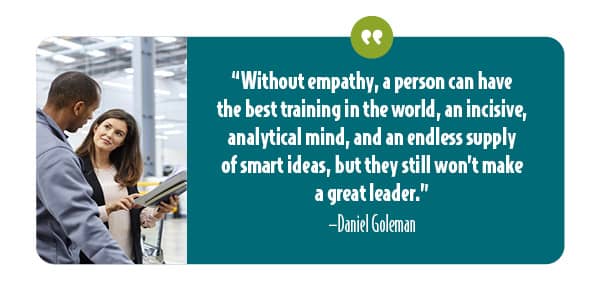The very essence of leadership is to lead oneself effectively, which then influences others in a positive and inspiring way. However, if we lack self-awareness or the ability to understand the results we want, it's hard to lead competently. Unfortunately, many leaders coast, rather than intentionally assert their authentic power. Are you one of them?
Estimated reading time: 5 minutes

Heartmanity is proud to partner with outstanding companies that we wholeheartedly recommend so this post may contain affiliate links. You can read our full disclosure here.
Emotional Intelligence in Leadership Makes a Successful Leader
To succeed, we must be able to look at the big picture while also taking practical actions and learning from past mistakes. And even when we can effectively govern ourselves, we then must be able to communicate and give direction to our team in a way that empowers instead of undermining their efforts or discouraging employees through micromanagement.
We must also be empathetic leaders, learning to not only understand the emotional terrain of our team and employees but also help to break the code of needs underlying behavior.
Although we greatly value intelligence and academic excellence in business, emotional fitness skills have been found to be even more vital to leadership. It turns out that if we can't govern ourselves, we cannot lead others.
Empathy Is Essential to Personal and Professional Success
You can think of EQ as a staircase to personal and professional success. Why? Because all interpersonal skills depend on emotional intelligence. If we can't control knee-jerk reactions in our relationships at home and work, emotional landmines break down trust and deflate our positive influence.
If we are unaware of how we affect others, we cannot learn to respond in more respectful ways. If we lack emotional intelligence in the workplace, we tend to depend heavily upon our intellect but ignore what's most vital for interpersonal relationships.
The good news is that emotional fitness competencies can be learned. These skills are worth pursuing; they are critical in the varied and many responsibilities a leader faces daily. Even the ability to envision is one of these competencies.
Why Empathy Is Important in Business
Harvard Business Review talks about how empathy became a key skill for leaders. It is no longer negotiable for those who want to excel in leadership or in management. And Daniel Goleman who is the pioneer of bringing the concept of emotional intelligence to the workplace says this about empathy.

So how do you learn emotional intelligence in leadership?
The first step in all learning and growth is awareness. And learning to listen to your emotional wisdom is no different. Becoming aware of how we think, make decisions, manage our emotions, talk to ourselves, and communicate with others are necessary building blocks.
Related reading: "Why Empathetic Leadership Makes a Massive Difference in Today's Workplace."
Exercise for Building Empathetic Leadership
Try the following exercise and discover how your ability to lead depends on how aware you are and how well you govern yourself internally.
Mindfulness is one slice of emotional intelligence, yet a mindfulness practice helps to develop emotional fitness. If you can learn to redirect yourself masterfully, this habit will impact how well you guide others through empathetic leadership. Mindfulness will empower you to slow down your emotional responses and suspend judgment so you can shift to openness and curiosity.
Related reading: "Leadership in Business: Struggle or Ease?"
Self-Awareness Exercise
WEEK 1: Observe your thoughts carefully without judgment for one week.
WEEK 2: Continue to observe your inner dialogue and begin to replace any negative thoughts with more positive ones.
WEEK 3: Now add ten minutes of conscious daily practice. Every time the mind tries to discourage you, quiet the chatter and focus only on your breath instead. (Or you can put your attention on the light rays hitting the tree leaves outside your office.)
WEEK 4: Continue to practice quieting your mental chatter. Now raise your awareness and listen to your inner guidance. Your intuition is there if you listen; turn up the volume! Whenever you hear it, act on its guidance.
WEEK 5: Reserve twenty minutes in your workday as a regular time to calm your mind and listen. Make it a ritual you never miss.
Authentic Leadership Requires Awareness
Another key to learning to lead from within is to observe how well your actions match your words. When words and actions match, authenticity is the result.
Communicating with empathy and emotional intelligence often flattens conflict and creates collaboration with synergy. Being mindful of what we say and how it affects others is essential to authenticity.
As Goleman stated in a Harvard Business Review:
"To be authentic is to be the same person
to others as you are to yourself."
 The first step toward more authenticity is observation. Keep a mental log noting the gaps between our words and actions. For example, ask questions such as:
The first step toward more authenticity is observation. Keep a mental log noting the gaps between our words and actions. For example, ask questions such as:
- Do I make commitments and then show up half-heartedly? If so, did I really want to do what I agreed to?
- Do I agree with someone but secretly disagree? What am I avoiding?
- Do I tell someone I feel great while covering up anger or resentment?
- Do I say one thing and do another?
Paying attention to wherever your words are not followed through with actions will give you valuable information. You'll learn what you are making important. By watching for incongruences, you can close the gap and be more authentic.
Related reading: "How to Skyrocket Your Results with Authentic Leadership"
Examples of Ineffective Leadership and Low Emotional Intelligence
Ineffective Leadership Example #1
An employee spontaneously walks into your office with a complaint. You spend forty-five minutes helping him or her calm their upset and solve their problem. However, you end up giving away crucial time that you needed for a timely project.
LeaderShift Solution #1
Find a way to be firm and kind when boundaries are needed for priority work. Let the person know that you would like to support them but need the morning time to finish an important project. Then you schedule a meeting in the afternoon to discuss the work challenges at a more convenient time.
Ineffective Leadership Example #2
You deeply value honesty but find yourself watering down constructive feedback when evaluating an underperforming employee.
LeaderShift Solution #2
Time to increase courage. Motivate yourself to be candid by focusing on the long-term benefits of giving vital feedback to help your employee grow and excel. Envision how he or she will be empowered by your experience and input, then speak your truth honestly.
Ineffective Leadership Example #3
You spend an inordinate amount of time with an employee that is ill-equipped to do the job that he or she was hired for. They make excuses when they miss timelines and you give extensions repeatedly but fail to shift this ongoing pattern.
LeaderShift Solution #3
You have a meeting with the employee and point out the pattern of missed timelines. Together you assess their time management skills and the need to break projects down more effectively. Then you set up reasonable check-ins to ensure that they stay on schedule.

Closing Thoughts
The skill of empathy is not just for nurses.
By practicing self-awareness and striving to align your values with your actions, you'll be on a path to greater inner peace and more ease in connecting with others. By taking the time to discern if your actions match your highest version of yourself, you'll be a more authentic leader and have the added bonus of leading from the heart.
Contact us at Heartmanity for a cultural check-up for your company or for executive coaching.
For more services, see Heartmanity for Business. To learn more about the four main components of EQ, read "What Is Emotional Intelligence?" or check out the Emotional Intelligence online course below.









